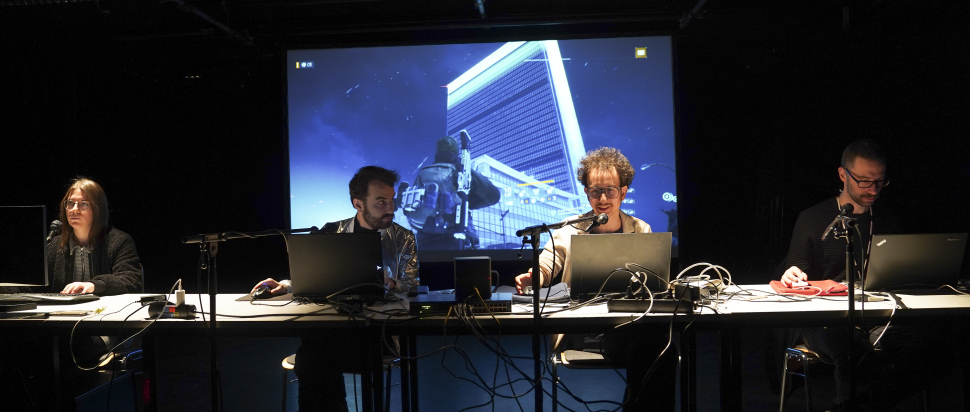Glasgow Short Film Festival: The 2020 programme
The newly independent Glasgow Short Film Festival announces its jam-packed five-day programme of over 180 screenings
Once again, Glasgow Short Film Festival will be pushing the boundaries of what makes a short film, with the 2020 edition of the festival opening with My First Film, a feature-length piece of expanded cinema from Zia Anger, described by GSFF as a radical, interactive live cinema performance. Elsewhere among this year’s 180 screenings spread over five days, you’ll find three more feature-length works.
Two of these features can be found in must-attend strand Barbed Wire Love: Artists and their North of Ireland Troubles, which marks 52 years since the commencement of Northern Ireland’s Troubles. Curated by Myrid Carten, an artist and filmmaker from Northern Ireland, and Peter Taylor, the Director of Berwick Film & Media Arts Festival, the programme is described as “intimate tales from Northern Ireland which disrupt the well-worn media narratives of fear, violence and victimhood.” Among these tales, you’ll find recent doc Trouble, Mariah Garnett’s gender-swapped retelling of her estranged father’s interfaith love story, and Pat Murphy’s Maeve, which was shot in 1981 at the hight of the Troubles.
This year’s director of focus is 33-year-old Thai filmmaker Sorayos Prapapan, whose social critiques have won him numerous awards both at home and internationally; Prapapan will be in town to discuss his short films in detail.
The use of commercial computer game graphics to create a cinematic experience is a well-established filmmaking form and will be wryly explored in front of a GSFF audience in Operation Jane Walk Live. Blockbuster multiplayer shoot-em-up computer game Tom Clancy’s The Division will be the canvas for Austrian artists Robin Klengel and Leonhard Müllner, who’ll use the game to take the audience on a live tour through a digital version of post-apocalyptic New York. We’re told to expect “our deadpan tour guides to take an incisive and absurdly humorous walk through the battleground, evading the gunfire while lecturing on architectural history and urbanism.”
Another highlight looks to be Black Spatial Imaginaries, which “explores the fluidity of Black communities through the concept of Black Geographies.” Matchbox Cineclub presents a celebration of visionary Japanese director Nobuhiko Ôbayashi. As well as his experimental films of the 60s – screening with English subtitles for the first time – Matchbox will also be screening Ôbayashi’s inventive and hilarious horror feature Hausu (House).
Musician Felix Kubin will be at GSFF for a screening of Marie Losier’s genre-defying audiovisual collaboration with the cult electronic artist, Felix in Wonderland, followed by a performance by th man himself; Glasgow dreampoppers BABE are also on the bill.
The Skinny are also excited to present their own programme at GSFF this year: a Best Scottish Shorts of the Decade lineup featuring some of our favourite Scottish films from the last ten years. The final lineup is still being finalised, but we hope to have several of the filmmakers at the screening to discuss how their practice has developed over the 2010s.
GSFF competitions
And of course, as ever, there’s the beating heart of the GSFF programme: its two competitions. Among the highlights of the always expertly curated International Competition is Something to Remember, the latest short from Swedish stop-motion genius Niki Lindroth von Bahr, and Black Bus Stop, a collaboration between Kevin Jerome Everson and Claudrena Harold. The Scottish Competition, meanwhile, welcomes back some familiar GSFF faces, including Ruth Paxton, Ross Hogg, Hannah Currie, James Price, Will Anderson and Martin Clark alongside some of the most exciting new voices on the Scottish filmmaking scene.
It's here! Check out the fantastic #GSFF20 trailer, courtesy of @hannahcurrie, alongside the full list of films selected for our International and Scottish competitions: https://t.co/AJl5raWNi9 pic.twitter.com/buKDrsLgs6
— Glasgow Short Film Festival (@GlasgowShort) February 5, 2020
GSFF co-director Sanne Jehoul explains that audiences should find a focus on ideas of place throughout the programme this year. “In our first year as an independent organisation, and in a ceaselessly contested socio-political landscape, putting together a programme exploring how the histories and realities of the spaces we live in and move through impact us felt like the right thing to do,” she says. “We hope Glasgow audiences will find a lot to respond to and engage with in the programme, from intimate accounts of Northern Ireland’s Troubles, an uncompromising examination of Black communities’ relationships to landscapes, in a live tour through a dystopian replica of New York City, and in Sorayos Prapapan’s gentle critiques of a corrupt and militaristic Thai society.
"We’re also proud to present some of the best new Scottish short films, as well as a fantastic selection of fresh work from around the world, with 23 countries represented in our International competition.”
Glasgow Short Film Festival takes place 18-22 Mar at various venues in Glasgow. For the full programme and to purchase tickets, head to glasgowshort.org
